|
|
|
Sort Order |
|
|
|
Items / Page
|
|
|
|
|
|
|
| Srl | Item |
| 1 |
ID:
155759
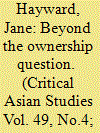

|
|
|
|
|
| Summary/Abstract |
A high-profile debate is taking place in China concerning the organization of agricultural land and production, with profound implications for China’s countryside. This debate is between those advocating for agricultural production to be taken over by large-scale agribusinesses, and those against this. Proponents regard agribusinesses as embodying modernity and progress, while those against forewarn of the channeling of profits out of peasant hands, the loss of peasants’ autonomy over labor and land, and the destruction of rural life. Recent English language publications on China’s agrarian change highlight the growing power of agribusiness and related processes of depeasantization, implying the Chinese debate on “who will till the land?” is futile. But this view obscures efforts by Chinese scholars and policymakers to promote forms of agricultural organization conducive to maintaining peasant livelihoods. By examining the Chinese debates on agribusinesses, family farms, and cooperatives, this article highlights points of contestation among policymakers and alternative possibilities, which may yet shape the course of China’s agrarian change. This article contributes to scholarship on China’s agrarian change, broader questions concerning depeasantization, and developmental possibilities under collective ownership.
|
|
|
|
|
|
|
|
|
|
|
|
|
|
|
|
| 2 |
ID:
143637
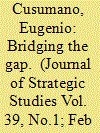

|
|
|
|
|
| Summary/Abstract |
The increasing use of private military and security companies (PMSCs) has attracted considerable scholarly attention due to its corrosive effects on US democracy. Drawing on neoclassical realism, this article provides a comparative dimension to the study of the political drivers of military privatisation by analysing contractor support to US and UK operations in Iraq and Afghanistan. Domestic political constraints have shaped both US and UK response to the need for more boots on the ground, increasing the propensity to use contractors as a force multiplier in spite of their problematic impact on military effectiveness.
|
|
|
|
|
|
|
|
|
|
|
|
|
|
|
|
| 3 |
ID:
099352


|
|
|
|
|
| Publication |
2010.
|
| Summary/Abstract |
Over the last three decades, privatization and restructuring of electricity sectors has been a hot topic. The expectation was that prices would fall due to increased competition and that generators would become more innovative and efficient. However, the enthusiasm for deregulation wavered after events such as the debacle in California, the fall of Enron and the setbacks of Ontario. In the Philippines, comprehensive legislation was passed in 2001 but the implementation has been rather slow and controversial. This paper looked at the allegation of politicizing power rates and found a logical alternative to the perceived conspiracy angle. Based on market data, it is highly probable that depressed market rates was a result of coping mechanisms of new players trying to adjust to the restructured industry.
|
|
|
|
|
|
|
|
|
|
|
|
|
|
|
|
| 4 |
ID:
104756
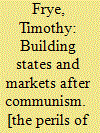

|
|
|
|
|
| Publication |
Cambridge, Cambridge University Press, 2010.
|
| Description |
ix, 296p.
|
| Series |
Cambridge studies in comparative politics
|
| Standard Number |
9780521734622
|
|
|
|
|
|
|
|
|
|
|
|
Copies: C:1/I:0,R:0,Q:0
Circulation
| Accession# | Call# | Current Location | Status | Policy | Location |
| 056009 | 338.947/FRY 056009 | Main | On Shelf | General | |
|
|
|
|
| 5 |
ID:
102411


|
|
|
|
|
| Publication |
2011.
|
| Summary/Abstract |
That good governance is necessary for economic development was until recently the conventional wisdom. In 2002, for example, a USAID study asserted that 'without good governance, it is impossible to foster development'. The Economist's Africa editor, Robert Guest, wrote in 2004 that 'Africa's wars spring mostly from bad government … Bad governance is also the main reason why Africa is so poor.' Even Milton Friedman, a champion of market liberalisation, later endorsed the good-governance paradigm: 'I was wrong. It turns out that the rule of law is probably more basic [to development] than privatization.'
|
|
|
|
|
|
|
|
|
|
|
|
|
|
|
|
| 6 |
ID:
117179
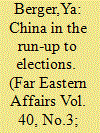

|
|
|
| 7 |
ID:
123963
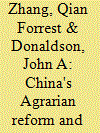

|
|
|
|
|
| Publication |
2013.
|
| Summary/Abstract |
Many reporters and scholars outside China advocate the privatization of land ownership in China as a necessary step for the transformation of China's agriculture system into a modern, large-scale, market-oriented and technology-intensive one. Chinese scholars advocating land privatization, for their part, typically argue that land privatization would better protect farmers' rights and interests. We present a contrarian view to these calls for land privatization. Under China's current system of collective land ownership and individualized land use rights, agriculture has modernized rapidly in China in a way that has avoided privatization's many downsides. Land privatization, by contrast, would only exacerbate class inequality and social tension in rural China and further weaken farmers' positions in dealing with more powerful actors. Through analyzing six dimensions of this issue-increasing investment in land and agricultural productivity, promoting scaled-up modern agriculture, protecting farmers' land rights and preventing land grabs, enhancing rural livelihoods, and facilitating rural migrants' integration into cities-we maintain that strengthening the current system is superior to privatizing rural land.
|
|
|
|
|
|
|
|
|
|
|
|
|
|
|
|
| 8 |
ID:
082390
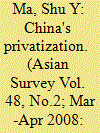

|
|
|
|
|
| Publication |
2008.
|
| Summary/Abstract |
A major breakthrough in China's privatization occurred in May 2005, when a "share conversion" pilot reform program was introduced. This article will situate this in the perspective of China's two-decade-long shareholding system reform. It will argue that the "share conversion" reform is part of China's long-followed gradualist transition, instead of a switch to shock therapy
|
|
|
|
|
|
|
|
|
|
|
|
|
|
|
|
| 9 |
ID:
174886


|
|
|
|
|
| Summary/Abstract |
Most of Kazakhstan’s wealth hinges on oil rents, and the overall performance of the economy is closely linked to petroleum’s price fluctuations. This study asks (1) why the institution of private ownership of oil proceeds has not led to a positive transformation of patron–client relations embedded in the country’s energy sector, thus challenging the relevance of the ‘private ownership’ narrative, and (2) why the collapse in the price of oil did not affect the stability and essential character of the regime in power. To answer these questions, the article examines two case studies: the privatization of the oil sector in the 1990s, and the post-2014 oil crisis. Thus the article problematizes important theories on oil-sector privatization and contributes to recent work on regime stability as it pertains to the resource curse. The analysis of the constitutive impact of oil wealth on Kazakh politics generates wider insights on the links between the power of informal networks and regime stability in petrostates through boom and bust cycles.
|
|
|
|
|
|
|
|
|
|
|
|
|
|
|
|
| 10 |
ID:
118735
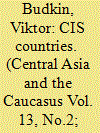

|
|
|
|
|
| Publication |
2012.
|
| Summary/Abstract |
December 1991 marked the beginning of a grandiose experiment whose purpose was to establish a whole group of independent states in the territory of a world giant known as the U.S.S.R., which occupied one-sixth of the Earth. Their establishment was based on the negation of the previous Soviet model providing for the domination of one party, which had imposed a no-choice ideology on the society, and for the administrative command system of politics and economics.
|
|
|
|
|
|
|
|
|
|
|
|
|
|
|
|
| 11 |
ID:
080874


|
|
|
|
|
| Publication |
2008.
|
| Summary/Abstract |
Today, in what has been described as a re-emergence of privately organized extraterritorial force, the private military and security industry supplies the major military powers with a range of core services. This article asks how such a development came about, and why it has become politically uncomplicated to outsource such intimate state functions as the executive branches of foreign policy programmes. How did certain states arrive at a situation where it is unclear whether core military and security affairs are run by public or private agencies? The article answers these questions by presenting and commenting on general explanations as to why the private military industry has grown so much in post-invasion Iraq. It adds new perspectives to existing scholarly work by suggesting that the reappearance of private extraterritorial force could not have occurred on such a scale without a restructuring of neutrality in international relations. It is suggested that this change in neutrality might constitute the sine qua non of the re-emergence of private extraterritorial force.
|
|
|
|
|
|
|
|
|
|
|
|
|
|
|
|
| 12 |
ID:
113328


|
|
|
|
|
| Publication |
2012.
|
| Summary/Abstract |
BAE Systems is the UK's largest defence and security firm and one of the world's major arms companies. It has changed from a state-owned aerospace firm to a privatised specialist defence company involved in a range of air, land, sea and cyber systems with a major presence in the US defence market. This article describes and assesses the history of the company, its organization, conduct and performance.
|
|
|
|
|
|
|
|
|
|
|
|
|
|
|
|
| 13 |
ID:
121964
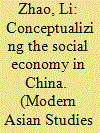

|
|
|
|
|
| Publication |
2013.
|
| Summary/Abstract |
This study offers a conceptual analysis of the social economy in China within the context of institutional transition. In China, economic reform has engendered significant social changes. Accelerated economic growth, privatization of the social welfare system, and the rise of civil society explain the institutional contexts in which a range of not-for-profit initiatives, neither state-owned nor capital-driven, re-emerged. They are defined in this research as the social economy in China. This study shows that although the term itself is quite new, the social economy is no new phenomenon in China, as its various elements have a rich historical tradition. Moreover, the impact of the transition on the upsurge of the Chinese social economy is felt not only through direct means of de-nationalization and marketization and, as a consequence, the privatization of China's social welfare system, but also through various indirect means. The development of the social economy in China was greatly influenced by the framework set by political institutions and, accordingly, legal enabling environments. In addition, the link to the West, as well as local historical and cultural traditions, contribute towards explaining its re-emergence. Examining the practices in the field shows that the social economy sector in China is conducive to achieving a plural economy and an inclusive society, particularly by way of poverty reduction, social service provision, work integration, and community development. Therefore, in contemporary China, it serves as a key sector for improving welfare, encouraging participation, and consolidating solidarity.
|
|
|
|
|
|
|
|
|
|
|
|
|
|
|
|
| 14 |
ID:
091230
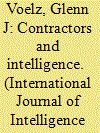

|
|
|
|
|
| Publication |
2009.
|
| Summary/Abstract |
At this juncture ongoing military operations and growing demand for domestic counterterrorism information will likely necessitate continuing reliance on private sector augmentation into the foreseeable future. Given this assumption, the time has arrived for the government to move beyond viewing its commercial augmentation as an ad hoc resource without having clear strategies and policy for its use.
|
|
|
|
|
|
|
|
|
|
|
|
|
|
|
|
| 15 |
ID:
183832


|
|
|
|
|
| Summary/Abstract |
Corporate privatization of security has generated a neoliberal iteration of an old profession: the private military contractor. This development has revolutionized security policies across the globe while reviving old patterns of inequality. Following neoliberal logic, outsourcing fosters two types of employment: the exploitative and the exclusive. The first refers to low-status individuals hired en masse to perform menial labor; the second refers to experts who perform functions central to the employer’s mission. We contribute to this discussion by focusing on the qualifications of a different subsample of this industry: American contractors who died while performing military and security functions in Iraq. We assert that such American employees directly engaged in mission-essential combat and security functions better fit the employment category of an exclusive, expert sector at the core of the private military industry.
|
|
|
|
|
|
|
|
|
|
|
|
|
|
|
|
| 16 |
ID:
125153


|
|
|
|
|
| Publication |
2013.
|
| Summary/Abstract |
Over the last few decades, and particularly after 9/11, we have witnessed the increasing criminalization of immigrants in the United States. Changing policies have subjected immigrants to intensified apprehension and detention programs. This essay provides an overview of the context and policies that have produced the rising criminalization of immigrants. We draw on the institutional theory of migration to understand the business of detention centers and the construction of the immigration-industrial complex. We link government contracts and private corporations in the formation of the immigration-industrial complex, highlighting the increasing profits that private corporations are making through the detention of immigrants. We conclude with a discussion of how the privatization of detention centers is part of a larger trend in which basic functions of societal institutions are being farmed out to private corporations with little consideration for basic human rights.
|
|
|
|
|
|
|
|
|
|
|
|
|
|
|
|
| 17 |
ID:
151823


|
|
|
|
|
| Summary/Abstract |
The privatization process that engulfed most Israeli kibbutzim influenced cultural changes in the Newplast factory. Following organizational difficulties and economic losses, the kibbutz management appointed a factory manager from outside to oversee changes. This management change accelerated inevitable transformations: the collectivist culture, which had previously favoured kibbutz members, became far more capitalistic. Today, the factory operates commercially without obligations towards individuals. Nevertheless, the new management has a dual value system: supporting a capitalistic approach to the worker while fostering the factory’s ‘homelike’ image, preserving some classic collectivist values and expecting its workers to feel a familial obligation to Newplast.
|
|
|
|
|
|
|
|
|
|
|
|
|
|
|
|
| 18 |
ID:
099907
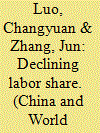

|
|
|
|
|
| Publication |
2010.
|
| Summary/Abstract |
This paper explores why labor share in China has declined since the middle of the 1990s. Existing literature usually ascribes the labor share decline in developed countries to biased technological progress. However, our investigation shows that China's case is different. Using a simultaneous equation model estimated with three-stage least squares, we find that FDI, levels of economic development and privatization have negative effects on the labor share. The negative influence of FDI on labor share results from regional competition for FDI, which weakens labor forces' bargaining power. A U-shaped relationship exists between labor share and the level of economic development, and China is now on the declining part of the curve. The negative effects of privatization on the labor share stem from the elimination of the so-called "wage costs eroding profit" situation and the positive supply shock on the labor market.
|
|
|
|
|
|
|
|
|
|
|
|
|
|
|
|
| 19 |
ID:
149770
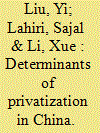

|
|
|
|
|
| Summary/Abstract |
This study investigates how the presence of foreign firms in a sector influences the privatization policy of domestic firms in that sector in China. We consider several variables to proxy for such a presence, from the perspective of the relative production scale, R&D and marketing, and labor productivity. By using the enterprise surveys carried out by the World Bank in 2005 of nearly 12,400 Chinese firms located in over 100 cities, we find that a rise in the presence of foreign firms increases the extent of the private ownership of domestic firms in a nonlinear fashion. Additionally, we apply IV-Tobit estimation with valid instruments and Tobit estimation with lagged key variables to deal with the possible endogeneity in the relationship between the presence of foreign firms and the privatization decision. Empirical evidence supports the main findings.
|
|
|
|
|
|
|
|
|
|
|
|
|
|
|
|
| 20 |
ID:
111231
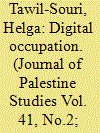

|
|
|
|
|
| Publication |
2012.
|
| Summary/Abstract |
In disengaging from the Gaza Strip in 2005, Israel did not end the occupation but technologized it through purportedly "frictionless" hightechnology mechanisms. The telecommunications sector was turned over to the Palestinian Authority under Oslo II and subcontracted to Palestine Telecommunications Company (PALTEL), furthering a neoliberal economic agenda that privately "enclosed" digital space. Coming on top of Israel's ongoing limitations on Palestinian land-lines, cellular, and Internet infrastructures, the result is a "digital occupation" of Gaza characterized by increasing privatization, surveillance, and control. While deepening Palestinian economic reliance on Israel and making Palestinian high-tech firms into dependent agents, digital occupation also enhances Israel's territorial containment of the Strip.
|
|
|
|
|
|
|
|
|
|
|
|
|
|
|
|
|
|
|
|
|